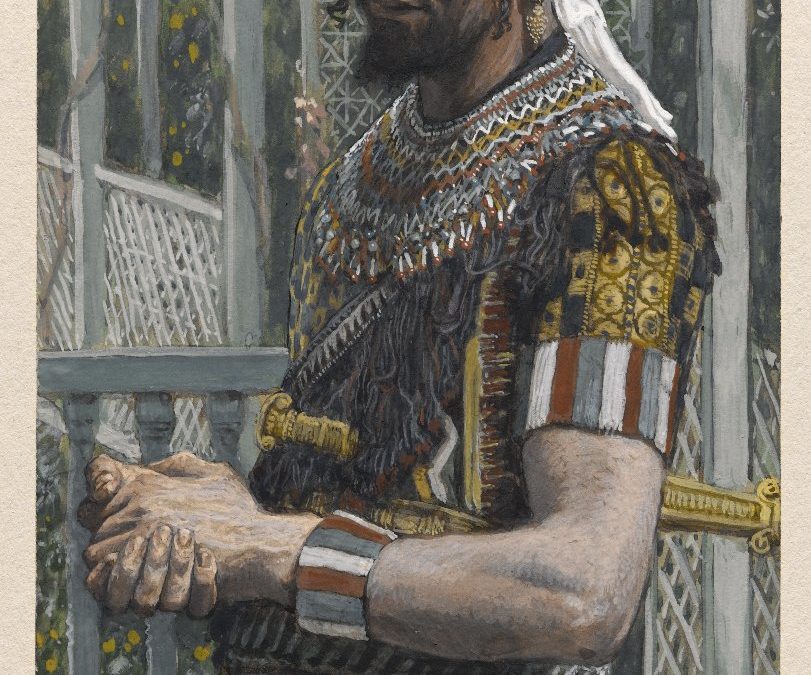 With the Olympic games of 2016 still fresh in my memory, I was surprised to learn recently that just before the time of Jesus, Herod the Great rescued the Olympic games and made sure they continued to be played on various Greek islands. He did this because he loved sports, but also because it was an effective way to keep his name alive and make sure people remembered that Herod the Great truly was great.
With the Olympic games of 2016 still fresh in my memory, I was surprised to learn recently that just before the time of Jesus, Herod the Great rescued the Olympic games and made sure they continued to be played on various Greek islands. He did this because he loved sports, but also because it was an effective way to keep his name alive and make sure people remembered that Herod the Great truly was great.
The problem was…Herod the Great was not so great. He wasn’t even Herod the So-So. He was Herod the Monster.
Herod was a big-time planner and builder, responsible for rebuilding the Jewish Temple at a scale never before seen. His Temple was even larger than the one built by Solomon. But if you think rebuilding the Temple won him friends among the Jews, think again.
Herod was only part Jewish, and he rose to power by making friends with the Romans—the enemy of the Jews. In 37 B.C., Herod led a Roman army of 30,000 infantry and 6,000 cavalry and conquered Jerusalem for Rome. He took many Jewish leaders prisoner and handed them over to the Romans, who promptly executed them. Herod also executed 46 members of the Jewish Sanhedrin—the Jewish Supreme Court.
Herod was a puppet king for Rome, but he was still called king of the Jews, despite having made enemies with so many Jewish people. What’s more, he was terrified of being overthrown by rivals. When Herod feared that his wife, Mariamne, was trying to poison him, he had her killed—even though he once adored her and named one of his fortress towers after her. He also thought the two sons he had with Mariamne were plotting against him, so he had them killed too.
No wonder the Roman emperor Augustus once joked, “It is better to be Herod’s pig than his son.†(The joke was that because Jews did not eat pork, their pigs were safer than Herod’s sons.)
In the Bible, we know Herod the Great from a similar story of paranoia and ruthlessness. In Matthew, chapter 2, you can read how Herod became terrified by prophecies of a new king being born in Bethlehem. Herod ordered that all of the baby boys two years old and under in Bethlehem and the surrounding area be killed, just to make sure he annihilated Jesus. But baby Jesus’s father, Joseph, was warned in a dream, and the holy family escaped safely to Egypt.
When Herod became sick and neared death, he knew that no one would mourn his passing. Therefore, he came up with a diabolical plan. According to the ancient Jewish historian, Josephus, Herod ordered that the most “illustrious men of the whole Jewish nation†should be taken out of every village and imprisoned in the Hippodrome. Then, at the moment of his death, Herod said all of these men should be killed. That way, he would know that people would be crying on the day of his death, even if the tears weren’t for him.
Fortunately, when Herod died in the spring of 4 B.C., no one carried out this barbaric order, and the men lived.
Kings have been on my mind lately because I have been reading a lot about Jesus as King—first in Timothy Keller’s excellent book, Jesus the King, and then in N.T. Wright’s book, Simply Jesus. As these books make abundantly clear, Jesus ushered in a completely new type of kingdom. The Jews had been expecting a Messiah who would come in with a sword and drive out the hated Romans. Instead, Jesus came as a Messiah who would die for the sins of the world. He was a revolutionary King with a revolutionary message.
Both Jesus and Herod were called “King of the Jews,†but the contrast between them couldn’t be greater. Herod marched into Jerusalem with an army of 36,000, while Jesus rode a donkey into Jerusalem with a ragtag group of 12 disciples.
Herod built massive structures, dedicated to his name, while Jesus built a kingdom that would last forever. Herod put other people to death so he could live and keep his power. Jesus, on the other hand, gave up His power and died so that others could live.
By Doug Peterson
